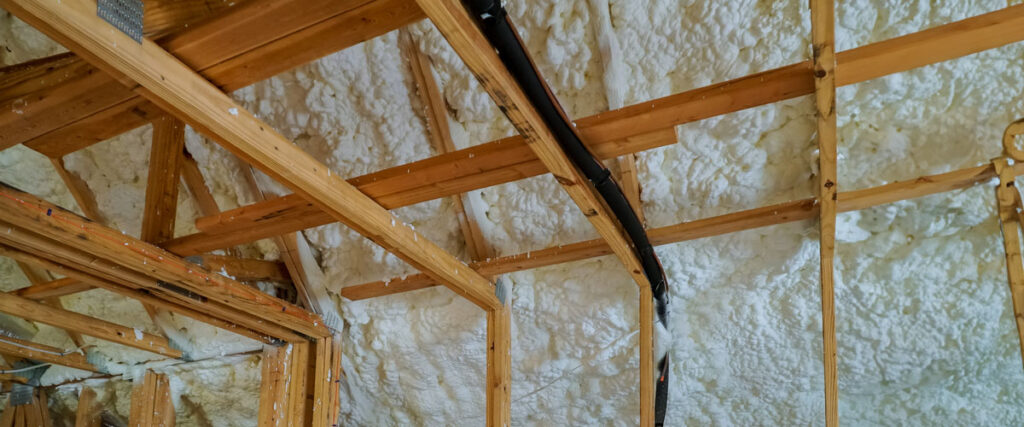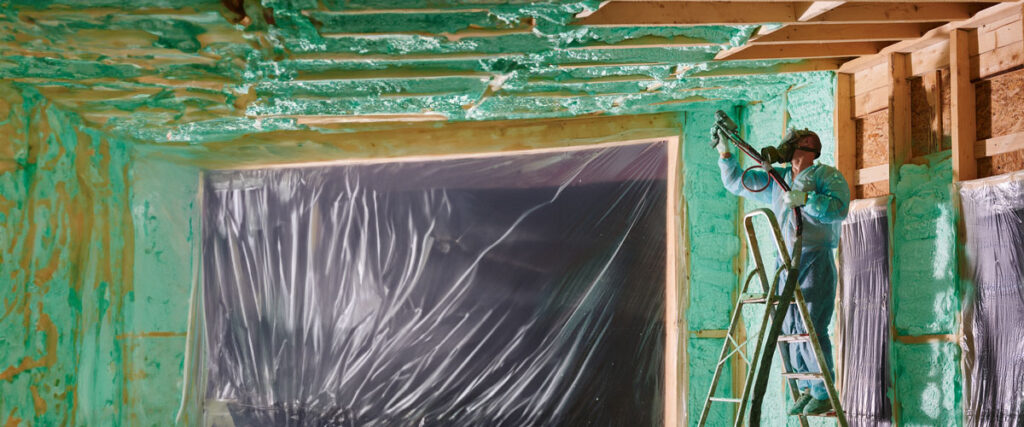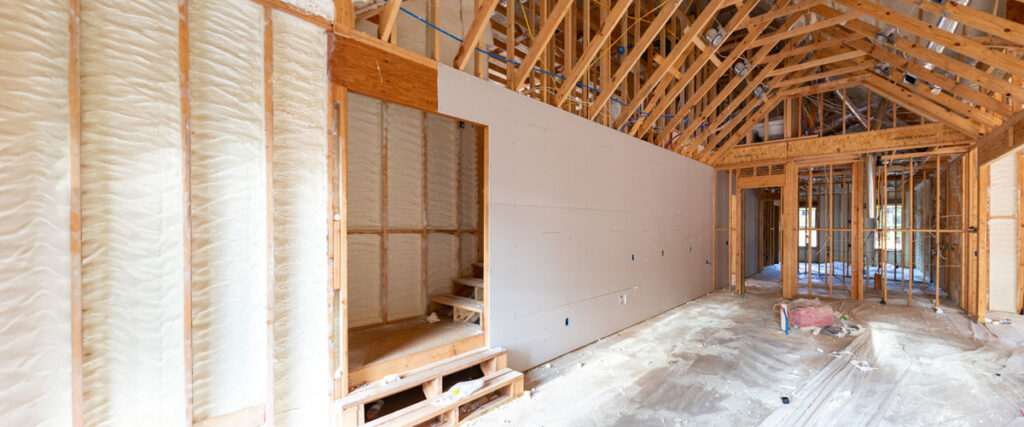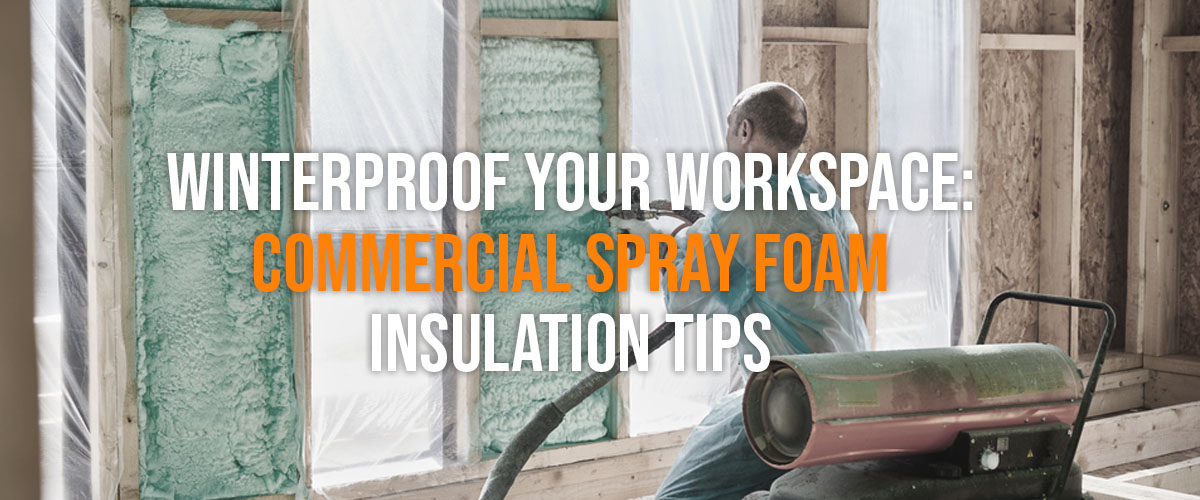Winterproof Your Workspace: Commercial Spray Foam Insulation Tips
As winter approaches, the importance of preparing commercial workspaces for the chilly season cannot be overstated. The colder months can be especially harsh on commercial properties, leading to increased heating costs, uncomfortable indoor environments, and potential damage. One effective solution to combat these challenges is commercial spray foam insulation.
Moreover, in this article, we’ll delve into the world of commercial spray foam insulation and provide valuable tips to winterproof your workspace.

Understanding Commercial Spray Foam Insulation
Commercial spray foam insulation is a versatile and efficient insulation material used to seal gaps and create an airtight barrier in commercial buildings. It comes in two main variants: open-cell and closed-cell. Open-cell foam is less dense and offers excellent sound absorption, while closed-cell foam is thicker and provides superior thermal resistance.
A. How Commercial Spray Foam Insulation Works
This insulation material is applied as a liquid, expanding to fill gaps and hardening into a solid foam. It adheres to various surfaces, making it ideal for insulating walls, ceilings, floors, and roofing. The expanding nature of spray foam allows it to seal even the tiniest cracks and crevices, providing a high level of insulation.
B. Suitability for Various Commercial Applications
Commercial spray foam insulation suits various applications, from office spaces to warehouses and industrial facilities. Its versatility and effectiveness make it a valuable choice for businesses looking to improve energy efficiency, comfort, and sound insulation.

Benefits of Commercial Spray Foam Insulation
Commercial spray foam insulation offers a multitude of advantages. It significantly improves energy efficiency, enhances comfort, reduces noise levels, and provides durability and longevity.
1. Reduction in Heating Costs:
The potential of spray foam insulation to significantly reduce heating costs is one of its main advantages. Creating an airtight seal prevents warm air from escaping, thus decreasing the need for constant heating.
2. Lowering Utility Bills:
The increased energy efficiency translates into lower utility bills. Over time, these savings can offset the initial investment in insulation.
3. Maintaining a Consistent Indoor Temperature:
Spray foam insulation ensures a consistent indoor temperature, eliminating uncomfortable fluctuations. Employees and clients alike will appreciate the cozy workspace during the winter months.
4. Eliminating Drafts and Cold Spots:
Say goodbye to pesky drafts and cold spots. Spray foam insulation seals gaps thoroughly, ensuring a draft-free environment.
5. Improving Acoustic Insulation:
Besides thermal benefits, spray foam insulation also excels in sound insulation. This is particularly relevant for office and workspace environments where a quiet atmosphere is essential for productivity.
6. Relevance in Offices:
In office settings, reduced noise levels improve concentration and overall employee satisfaction.
7. Lifespan of Commercial Spray Foam Insulation:
With a lifespan of several decades, adequately installed spray foam insulation is a long-term investment in your workspace’s comfort and energy efficiency.
8. Minimal Maintenance Required:
Unlike traditional insulation materials, spray foam requires minimal maintenance, making it a hassle-free choice for commercial properties.

Identifying Key Areas for Insulation
Knowing where to focus your efforts is crucial when insulating your commercial space effectively. Identifying critical areas for insulation is a strategic approach that ensures you get the most out of your investment.
- Walls: Insulating walls is crucial to prevent heat loss and maintain a comfortable temperature inside the workspace.
- Ceilings: Adequate ceiling insulation helps trap heat and prevents it from escaping through the roof.
- Floors: Insulating floors keep spaces warm and provide a barrier against moisture.
- Roofing: A well-insulated roof helps regulate indoor temperatures and prevents ice damming and roof damage during the winter.
Prioritize areas based on their impact on energy efficiency and comfort. Start with spaces that experience the most heat loss or are susceptible to drafts.

Choosing the Best Spray Foam Insulation Type
Understanding the differences between open-cell and closed-cell insulation is crucial. Open-cell foam is more cost-effective and offers excellent sound insulation, while closed-cell foam provides superior thermal resistance and moisture control. Consider factors when selecting the type, such as:
- climate
- budget
- and specific insulation needs
For frigid climates, closed-cell foam may be preferable, while open-cell foam is often a cost-effective choice for moderate temperatures. Budget is a crucial factor when choosing insulation. While closed-cell foam may have a higher upfront cost, its long-term benefits may outweigh the initial investment.

Professional Installation
For commercial settings, hiring professionals for insulation installation is essential. They have the expertise to ensure a proper and efficient installation process. Professionals can tailor the insulation to your workspace’s unique needs, ensuring maximum effectiveness. Additionally, their experience minimizes the risk of errors and ensures safety.
When choosing an insulation contractor, seek recommendations, check credentials, and request quotes from multiple providers. A reputable contractor will provide references and demonstrate their expertise.

Preparing Your Workspace for Insulation
Before insulation, prepare the workspace by clearing areas and ensuring access to all necessary surfaces. This streamlines the installation process and reduces potential disruptions.
During installation, prioritize safety. Inform employees about the insulation project, and establish safety protocols to protect everyone involved.
Acknowledge that temporary disruptions may occur during the insulation process, such as noise or workspace limitations. Communicate these issues in advance to minimize inconvenience.

Cost Estimates and Budgeting
The cost of commercial spray foam insulation in Kansas can vary depending on the type, area to be insulated, and the contractor’s rates. Request detailed quotes to understand the specific costs involved.
Plan your budget carefully, considering insulation costs alongside expected energy savings. This will help you determine the return on investment over time. Explore available incentives and tax credits for commercial properties. Some regions offer financial incentives to encourage energy-efficient improvements.

Maintenance and Long-Term Benefits
A. Tips for Maintenance
Maintaining commercial spray foam insulation is straightforward. Regular inspections and prompt repairs for any damage will ensure its long-term effectiveness.
B. Long-Term Benefits
Expect long-term benefits in terms of energy savings and return on investment. These benefits will continue to accumulate over the lifespan of the insulation.
C. Potential Concerns
Address potential concerns, such as moisture management, by consulting with your insulation contractor. Proactive measures can mitigate any issues.

Seal, Warm, Work: Cozy Office Bliss!
Winterproofing your commercial workspace with spray foam insulation is a wise investment that offers many benefits. The advantages are substantial, from improved energy efficiency and comfort to noise reduction and long-term durability. We encourage business owners and facility managers to consider this upgrade for a more comfortable, cost-effective, and sustainable workspace.
Lastly, don’t wait for the next winter to catch you unprepared. Take action today by scheduling a consultation with experienced insulation professionals. They will help you tailor a solution that suits your needs, ensuring your workspace remains cozy and efficient throughout the cold months. Winterproofing is not just about staying warm; it’s about safeguarding your business’s success in any season.







